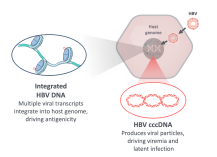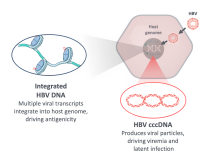Tune Therapeutics unveils potentially curative approach to treating chronic HBV infection
 Reviewed
ReviewedPioneering epigenome editing company Tune Therapeutics has announced it is working on a new and potentially curative approach to treating chronic HBV infection.

Image Credit: Tune Therapeutics
The Tune HBV program was unveiled by Dr. Ed Gane, Professor of Medicine at the University of Auckland and world-renowned authority on Hepatitis B Virus (HBV) at the American Association for the Study of Liver Diseases (AASLD) conference in Boston, MA on November 11th. The program, described by Gane at a session on emerging HBV treatments, aims to utilize TEMPO –Tune’s proprietary ‘genetic tuning’ platform – to achieve functional cure through the permanent, epigenetic repression of viral activity.
HBV affects upwards of 296 million people worldwide, and though an effective vaccine exists, its acceptance and uptake are far from complete. Nearly 90% of unvaccinated infants infected with HBV will develop a lifelong, chronic condition, and for the vast majority of these patients, existing standard of care (SOC) treatments have proven insufficient to clear infection. This is primarily due to the stable, latent nature of the virus, which can persist in two forms – integrated into the host’s genome, and in extra-chromosomal cccDNA depots – for decades at a time.
To date, most attempts at HBV treatment have focused on disrupting viral replication or restoring host immune response against the virus. But because they leave the cccDNA depots – the effective source of new viral particles – intact, they merely suppress the virus, rather than shut it down. Here, explained Dr Gane, is where Tune Therapeutics is looking to change the equation.
Tune has a powerful and fundamentally new approach, unlike anything else I have ever seen in clinical development. It directly targets both the integrated HBV and cccDNA, which we in the field have long identified as a prerequisite for a functional cure, and it does so using epigenetic systems that we know to be involved in viral silencing.”
Dr. Ed Gane, Professor of Medicine, University of Auckland
In rare cases, chronic HBV patients are able to maintain control of the virus without drug intervention via spontaneous transcriptional silencing of the virus DNA. As Tune Therapeutics’ Chief Scientific Officer Derek Jantz elucidates, this fact was the crucial driver for a new therapeutic approach using TEMPO.
“We can leverage the same, exact mechanism of virus control that we observe in these functionally-cured patients by switching off the virus using a targeted epigenetic silencer. This is an exciting time for the field, and we’re hopeful this first-in-class therapy will be transformative for chronic HBV sufferers worldwide.”
Tune Therapeutics will be presenting preclinical data on its HBV program at the upcoming Hep DART conference in December 2023, and is aiming to dose its first patient in 2024, with Dr Gane serving as Lead Investigator.
Tune Therapeutics
Posted in: Drug Discovery & Pharmaceuticals | Genomics
Tags: Chronic, DNA, Genetic, Genome, HBV, Hepatitis, Hepatitis B, Hepatitis B Virus, Immune Response, Liver, Medicine, Preclinical, Therapeutics, Vaccine, Virus
